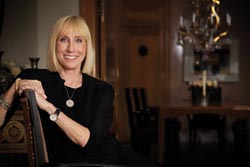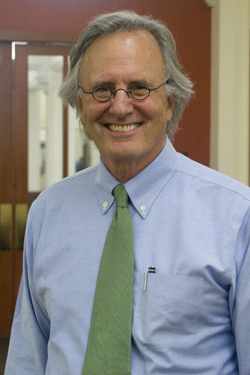Filed Under > TC People
Setting Hearts on Fire
A new book by alumna Jill Iscol (written with faculty member Peter Cookson) tells the stories of young people trying to change the world. Now there's a workshop, too
A new book by alumna Jill Iscol (written with faculty member Peter Cookson) tells the stories of young people trying to change the world. Now there’s a workshop, too
By David McKay Wilson
They were a diverse group, but the 24 TC students who assembled on a cool Saturday in late March for a workshop called “Hearts on Fire” clearly were driven by a burning desire to change the world.
Megan Shudde, a master’s degree student in TESOL (the teaching of English to students of other languages), was determined to develop programs for fostering literacy among adolescent immigrants. Jonathan Vant, who is earning his master’s in sociology and education, hoped to create an organization that infuses curriculum with social justice issues. Lauren McDade, graduating this spring with a master’s degree in politics and education, had her heart set on returning home to Baltimore to help establish a local chapter of City Year, the nonprofit that sends young people into communities for a year of full-time service.
“I so want to be a part of it,” said McDade, who was a City Year corps member in 2010-11.
From Jill Iscol’s perspective, Shudde, Vant, McDade and their fellows further validate the guiding premise of her recent self-published book, Hearts On Fire: Twelve Stories of Today’s Visionaries Igniting Idealism into Action.
“There is such a well of desire for change in this generation,” said Iscol (Ed. D. ’76, M.A., ’68), who conceived the idea of the book and co-authored it with TC Adjunct Professor of Education Peter W. Cookson, Jr., the founder of Ideas without Borders, a non-profit specializing in 21st century education and human rights. “It’s heartwarming, and hopeful, to see so much idealism,” said Iscol.
Hearts on Fire, the book – which contains a preface by former President Bill Clinton – in essence describes the personal journeys that brought its young heroes to the “Eureka!” moments that launched them on the path to tackle some of the world’s most dire problems. A young woman standing on the shores of Lake Victoria in Africa envisions a floating hospital that can deliver health services to villages isolated by the lack of roads and other infrastructure. The orphaned daughter of Mexican farmworkers, reconnected to her past through college courses on environmental issues, launches a campaign to bring clean drinking water to California’s San Joaquin Valley.
Iscol’s own story reminds us that 20- and 30-somethings aren’t the only ones hearing the trumpet’s call to service. A teacher at Bank Street College early on in her career and then an interim director in pre-service teacher preparation at TC, Iscol switched gears after attending the first-ever White House Conference on Philanthropy, held in 1999, to which she contributed, and the annual Gore Family Reunion Conference, aimed at strengthening American family life, which she chaired from 1997 to 2000.
“I met so many brilliant and talented people,” she says. “They could have done anything they wanted, but they were searching for more meaningful lives.”
Subsequently, Iscol and her husband Kenneth, a telecommunications executive, explored the concept of strategic philanthropy, and set up a private philanthropy, the IF Hummingbird Foundation. She also served as finance chair for Hillary Clinton’s senatorial and presidential campaigns.
Now, Jill Iscol is making a big name for herself as a visionary philanthropist. Hearts on Fire has turned out to be the right idea at the right time – so much so that Random House plans to publish the book in paperback later this year and to launch a campaign to bring it to high schools and colleges across the country.
Iscol shared her experiences with the workshop attendees in March, as did two of the people profiled in Hearts on Fire.
Vivian Nixon, Executive Director of the College and Community Fellowship, spoke about her journey from suburban Long Island to state prison to the helm of a nonprofit that helps women transition from incarceration to life back in the community.
“This is much more than a job, it’s my purpose,” said Nixon.
Former journalist Jimmie Briggs described his transformation from war correspondent to international crusader in the campaign to stop violence against women. As a journalist, Briggs wrote about child soldiers and the use of rape as a weapon in war. He was moved to take action after interviewing a woman who had been gang-raped by soldiers, twice in one day.
“That experience pierced the shell around my heart,” Briggs told the workshop participants. “I had reached my capacity as a journalist. I was at my limit. And while I had no experience as a social entrepreneur, I could bring my passion to the issue.”
Briggs launched his organization, Man Up, at the 2010 soccer World Cup in South Africa. Today Man Up is conducting grassroots campaigns in 25 nations to promote non-violence to young men through the vehicles of sports and music. Briggs said he succeeded by building a team, finding high-profile supporters and digging in his heels.
“A big dose of stubbornness really helped,” he said.
The Hearts on Fire workshops are being led by Iscol’s collaborator Peter Cookson, a sociologist and the author of 15 books that focus primarily on class and inequality (including Sacred Trust: A Children's Education Bill of Rights, published last year by Corwin Press, which outlines 10 fundamental rights and needs of American schoolchildren). The attendees at the March session at TC ran the gamut, with some ready to launch their ideas, some struggling to get their projects off the ground as they faced the crushing demands of family, school, and the need for start-up capital, and others still translating their far-flung dreams into concrete plans.
Cookson organized them into small groups to talk about building community, the “Aha” moments in their own lives and subsequent “muddy points” when they’ve bogged down in working toward their goals, and how they envision their projects five years hence.
“Self-confidence is key,” said Cookson. “You need to surround yourself with people who are supportive.”
Iscol, who has provided seed money for an array of projects through the IF Hummingbird Foundation, addressed the particularly daunting challenge of securing funding for new ventures. She encouraged the participants to be bold in securing face-to-face meetings with high-worth individuals who can provide financial stability during the start-up phase. And she repeatedly cited the 12 stories in her book as proof that success is possible – and sorely needed in a troubled world.
“You need to continue moving forward,” she told the group. “And you need to go for it.”
Published Monday, Apr. 30, 2012


